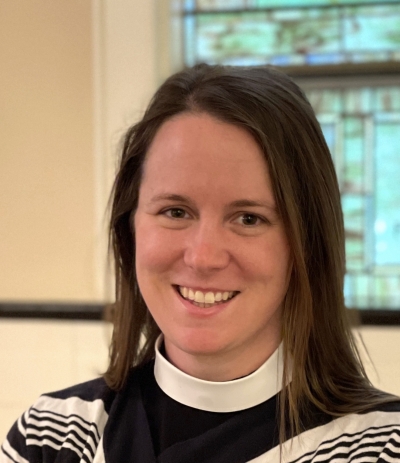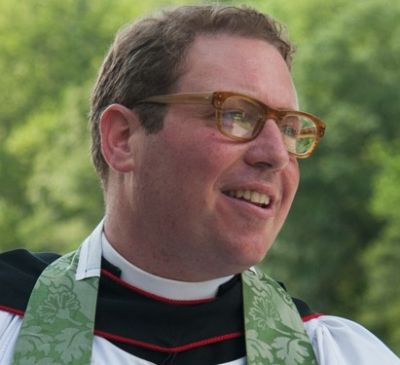Sermons from St. John's Episcopal Church
Jan 14, 2024 |
Come and See
| The Rev. Mary Beth Mills-Curran
Come and See
I can’t remember where I first heard it, but somehow I squirreled away a single piece of trivia about church growth: It claims the number one reason why people go to a new church for the first time is because someone invited them.
Now, this may well be among the 73.6% of statistics that are made up - but it stuck with me because it rings true of my own experience. Especially my experience of returning to church after a long time away.
Like many people raised going to church, I went mostly because my parents made me. This isn’t to say there weren’t things I liked about it - there were - a friendly community, snacks at coffee hour, singing songs together, crafts in Sunday School, occasional field trips. But I wasn’t a particularly spiritual child.
So, as I began to make my way in the world as an independent adult in college, and after graduation, church didn’t play a big role.
That is, until someone kept gently inviting me.
That person was the Episcopal Chaplain at MIT, where I was a graduate student. I’d met her years before I started at MIT, but I hadn’t stepped foot in the chapel since I’d arrived, so it was a shock to run into her walking out of my advisor’s office in the Political Science Department.
It might have just been a fun coincidence, and nothing more, but Amy took the opportunity to make it more. She invited me to “come and see” some of the work she was doing on campus. She invited me to join a committee that planned lectures for the Technology and Culture Forum. And she invited me to come to church with them on Wednesday nights.
That meeting, and that invitation to “come and see” was the beginning of a new path for me. One that would eventually allow me to truly encounter Jesus. And know him as “the Son of God” that Nathanael names in his meeting with Jesus.
—
This morning’s gospel is a classic choice for the season that follows Epiphany. Jesus is beginning to be recognized in Galilee. In this season we will hear a number of stories of his movement gaining momentum:
There are many different paths to following Jesus in the Bible.
For Nathanael, for Samuel, for us - an encounter with Jesus is just waiting for us to “come and see.” Sometimes we are Nathanael - reluctantly following a friend’s invitation. But sometimes we are also Philip - being the one to share with a friend, “I just found Good News.”
Come and See!
The Psalmist speaks for us saying, “Lord, you have searched me out and known me; you know my sitting down and my rising up; you discern my thoughts from afar.”
God knows us, loves us, and is ready to transform our lives, if we are open to it - so that someday, like Nathanael we may see heaven opened and the angels of God ascending and descending upon the Son of Man.
Now, this may well be among the 73.6% of statistics that are made up - but it stuck with me because it rings true of my own experience. Especially my experience of returning to church after a long time away.
Like many people raised going to church, I went mostly because my parents made me. This isn’t to say there weren’t things I liked about it - there were - a friendly community, snacks at coffee hour, singing songs together, crafts in Sunday School, occasional field trips. But I wasn’t a particularly spiritual child.
So, as I began to make my way in the world as an independent adult in college, and after graduation, church didn’t play a big role.
That is, until someone kept gently inviting me.
That person was the Episcopal Chaplain at MIT, where I was a graduate student. I’d met her years before I started at MIT, but I hadn’t stepped foot in the chapel since I’d arrived, so it was a shock to run into her walking out of my advisor’s office in the Political Science Department.
It might have just been a fun coincidence, and nothing more, but Amy took the opportunity to make it more. She invited me to “come and see” some of the work she was doing on campus. She invited me to join a committee that planned lectures for the Technology and Culture Forum. And she invited me to come to church with them on Wednesday nights.
That meeting, and that invitation to “come and see” was the beginning of a new path for me. One that would eventually allow me to truly encounter Jesus. And know him as “the Son of God” that Nathanael names in his meeting with Jesus.
—
This morning’s gospel is a classic choice for the season that follows Epiphany. Jesus is beginning to be recognized in Galilee. In this season we will hear a number of stories of his movement gaining momentum:
- Last week we heard about his baptism by John in the Jordan, and the voice that spoke from the heavens, naming Jesus’s authority as God’s son.
- This week and next we hear stories of the men that are drawn to follow Jesus, becoming his disciples.
- The name Nathanael only appears in the list of Jesus’s followers in this one Gospel, and even then only in two places: here…
- and then at the very end of John as “Nathanael of Cana,” when Jesus appears by the Sea of Galilee following the Resurrection.
- Because of his friendship with Philip, he has been identified for the last millennium with Bartholomew. Bartholomew also appears alongside Philip in the other gospels, and is more likely a surname meaning Son of Tolmay. So it has long been argued that there are the same guy.
- But, disciple or not, the call of Nathanael speaks to me - because it lays out a path that we can still follow today.
There are many different paths to following Jesus in the Bible.
- Many of them show people encountering Jesus directly and being moved by his message.
- This is what happens for Philip at the beginning of today’s reading.
- We can hear these stories and imagine what it might have felt like to meet him in the flesh.
- But these stories can still feel remote. Not like anything that might happen to us…
- He is brought to Jesus first by a story.
- Philip tells Nathanael about something he wants to share with him - and Nathanael is initially reluctant. “Can anything good come out of Nazareth?” You can hear the scorn in his voice from 2000 years away.
- And yet Philip simply says “Come and see.”
- I wonder how many of you have had experiences like this?
- Where you didn’t expect to be moved, or to experience anything real, and yet you came anyway, just to see what would happen.
- Maybe it was joining a new church - or coming to church at all.
- Maybe it was trying a new spiritual practice, a new way of praying, a meditation?
- Can you think of who it was that encouraged you?
- Who invited you to “come and see.”
- And who might you be called to invite?
For Nathanael, for Samuel, for us - an encounter with Jesus is just waiting for us to “come and see.” Sometimes we are Nathanael - reluctantly following a friend’s invitation. But sometimes we are also Philip - being the one to share with a friend, “I just found Good News.”
Come and See!
The Psalmist speaks for us saying, “Lord, you have searched me out and known me; you know my sitting down and my rising up; you discern my thoughts from afar.”
God knows us, loves us, and is ready to transform our lives, if we are open to it - so that someday, like Nathanael we may see heaven opened and the angels of God ascending and descending upon the Son of Man.
